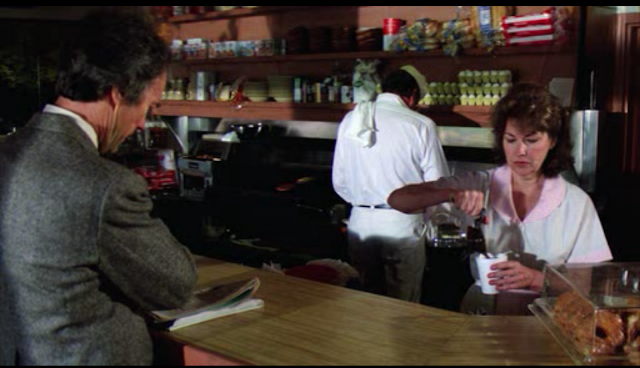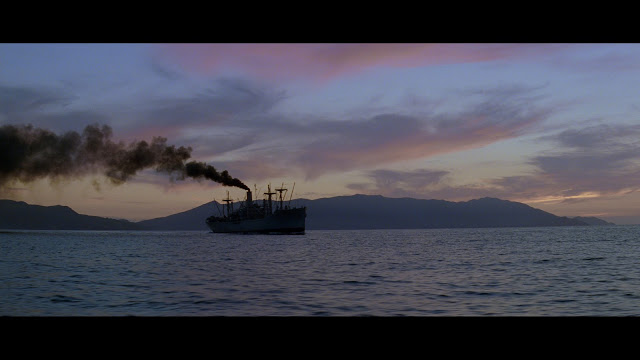fps
frames / per / sec
18.12.10
Sudden Impact: 10/40/70
Knowledge and ignorance. Loretta adds a mound of sugar to Harry's coffee to give him a signal. This frame holds her in a moment of knowledge, Harry in blissful ignorance. (Think of the most powerful moment of In the Bedroom: Matt Fowler [Tom Wilkinson] watching his wife Ruth [Sissy Spacek] while knowing he must now tell her their son is dead. Knowing he has the news to transform her ordinary, cheerful day into just about the worst of her life. Watching her for a moment in her ignorance, allowing her what seconds more he can.)
Loretta's stoic focus. Harry's inattention.
We are halfway between: we see the sugar Harry doesn't see, but we don't know what Loretta knows. Harry does not seem like the kind of guy who would take a lot of sugar in his coffee, never mind an absurd amount. Something is going on more than a character quirk, but what? Later, he will understand the message, later he will return and say to the black men trying to rob the place, "Now you boys put those guns down. We're not just gonna let you walk out of here." A young black men will say, "Who's we, sucka?" Harry will say, "Smith ... and Wesson ... and me." He will shoot one black man and another black man and another black man. The lone surviving black man will grab Loretta and hold a gun to her head. The centuries-old irrational, lynch-fueling fear of black men despoiling white women gets its snappiest taunt: "Go ahead. Make my day." Another movie star, while temporarily inhabiting the role of the most powerful man in the world, will issue the same taunt at tax increases.
But all that is in the future. Here, we have Harry, thinking this is just another day, just another cup of coffee. Here we have Loretta, trying to communicate. For Harry, who shoots men of any race with some regularity, this day will not be extraordinary because of bullets, but because of sugar.
Another woman threatened -- more than threatened: raped and shattered. What we only feared for Loretta is here made real in a flashback. The criminals aren't the random hoodlums who wanna git you sucka, the quick fodder for Harry's cannon, but instead the central antagonists of the film, the white trash conspirators against purity and innocence. Here the shot puts us over the shoulder of the rapist, letting us feel both complicity and empathy: we get to be on top, but what is most in focus is the woman's anguished face. The scene is long and excruciating. Its purpose is primarily to aim our emotions at vengeance and vigilantism, the choice Harry makes by the end of the film. But we also get a thrill because any buried sadism in our personality is brought to the surface here. The lily-pure women suffer and strain and scream with gusto, the terror and pain agonized across their faces, and we are encouraged to feel the terror and pain along with them, encouraged to want nothing more than to kill these men, to displace our bloodlust into righteous vengeance. Another woman is there, looking on, and it is perhaps her point of view we are in in this frame: the cruel ringleader, the lesbian, the faulty woman whose sex is born of hate, whose vengeance against her own sharp ugliness is wrought against the pure and beautiful. She defiles, seeking to create all women in her image.
The detective beats his way toward answers. A woman whose husband is among the murdered holds the hunting rifle, its scope aimed at Harry's head. A strong woman now, her strength erect and extended and ready to shoot. She is not pure and beautiful, though; her gun is not dainty; she is sexless, de-sexed, able to compete with these men in their rough-and-tumble tangle over truth, able to give the last word. Harry makes it clear, though, that his masculinity is fungible. He'll be back. He seeks in the end to empower women, but not this kind, not this he-she-thing, for which he has only contempt. We're on her side in this frame, though. Two men, doing what macho men do: destroy each other. She stops it and holds them in her power here. Our power. Perhaps she's the real hero of the story.
"I'll come back," Harry will say, "when you're less bereaved."
To which she should have replied: "Go ahead. Make my day."
Labels:
10/40/70,
Clint Eastwood,
Dirty Harry,
Sudden Impact
9.12.10
Subscribe to:
Comments (Atom)
















